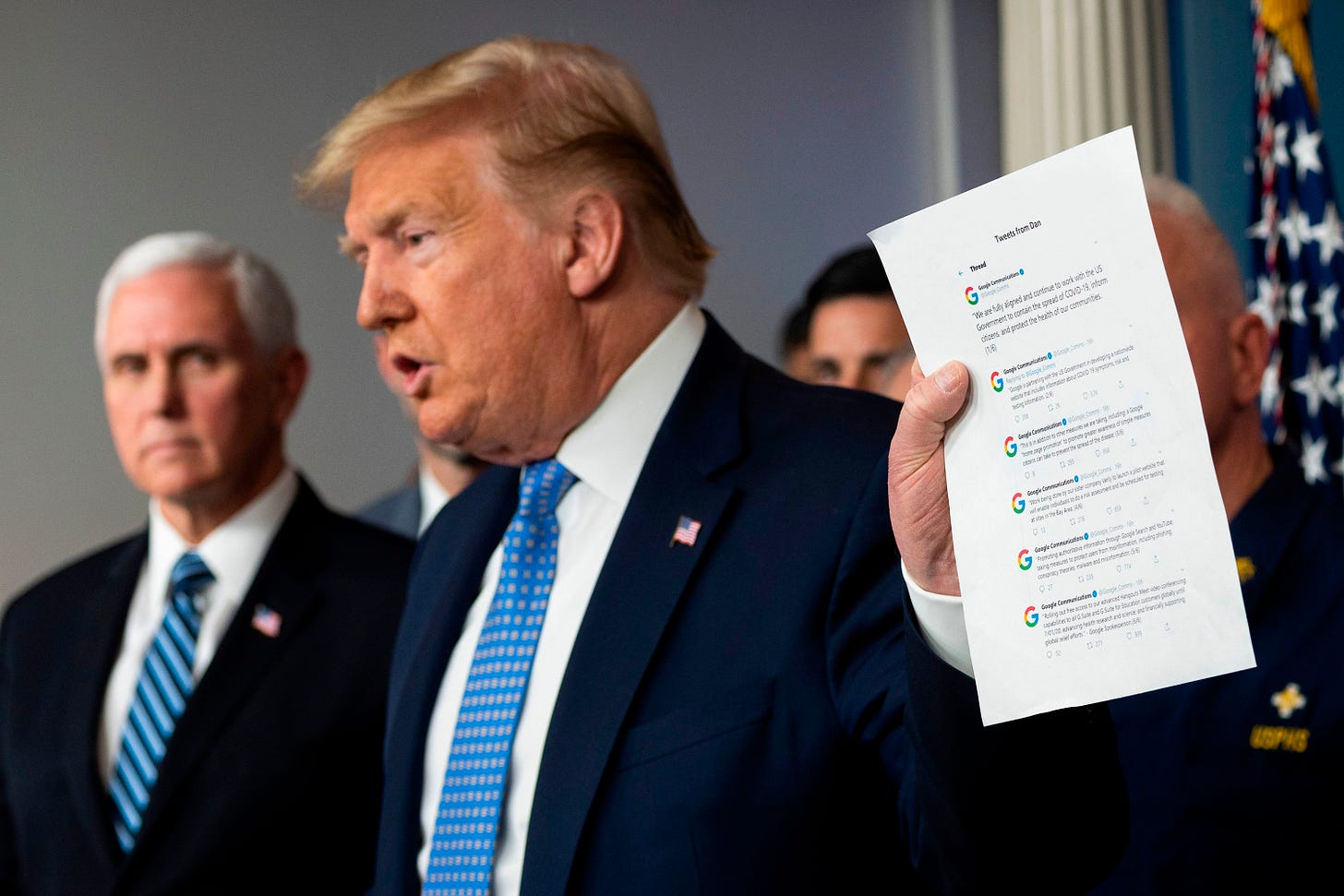How Twitter Could Help Save Us From COVID-19
In a pandemic, misinformation can be deadly. Twitter can help.

Donald Trump is right about one thing: Getting private companies involved in the coronavirus response is a great idea. With the federal government making a hash of it, we’re going to need the private sector to ride to the rescue.
For instance: Despite the government’s claims last Friday, there is no website where anyone in America can enter their symptoms, get approval for a test, and then drive to their local Walmart to have it done. Nor is there likely to be one for a long time, if ever. On the bright side, private laboratories are now getting involved so there is some hope that coronavirus testing will be massively expanded.
And there are other places where the private sector could step in to clean up the Trump administration’s mess.
The CDC has a 450-page crisis communication manual which can be summed up by the six words on its cover: “Be first. Be right. Be credible.” President Trump is very often first. It’s the other two concepts that have been problematic for him. And when the chief executive forfeits his credibility, he makes it difficult for the rest of the federal government beneath him to be credible, either.
And this isn’t a problem that the federal government can fix on its own. The credibility boat sailed when Donald Trump insisted that coronavirus was no big deal and just like the flu. Once your credibility is gone, it’s gone.
Since we can’t rely on the federal government, it’s going to be up to private industry, especially social media, to make sure that Americans get timely and correct information about the pandemic rather than wild speculation, rumors, and Russian disinformation.
There is a lot that social media platforms can do.
Take Twitter for example. In the past, Twitter’s hands-off approach has often turned it into the media equivalent of an open sewer where conspiracy theories, half-truths, lies, and active misinformation spread by everybody from your Uncle Bob to Russian troll armies all slosh together along with dog pictures, NBA highlights, and arguments about movies.
Twitter has been reluctant to intervene with the freedom of people to post in its feed because (1) founder/CEO Jack Dorsey prizes freedom of speech, and (2) trying to referee this free-for-all would be enormously expensive and would ultimately require pushing out some number of users. And on top of that, Twitter has always been very good about recognizing that it can be difficult to draw reasonable lines without taking sides.
But a pandemic is different. You are entitled to your personal opinion on whether Nancy Pelosi hates America or whether Donald Trump should have been impeached. Whether or not the coronavirus is more deadly than the flu is not an opinion. It’s a fact. And it’s a fact which, at the present moment, is material to public health.
Free speech doesn’t let you yell “Fire!” in a crowded theater and it probably shouldn’t let you yell “The virus is a Hoax!” in a pandemic. Or rather: You can say “The virus is a Hoax!” if you want to—but Twitter shouldn’t be obligated to let you publish it on its platform.
There is no reason that Twitter couldn’t prohibit people from spreading misinformation. The company could easily make the spreading of false coronavirus information an explicit violation of Twitter’s terms of service and anyone—even important Blue Check Marks—who does so should have their account suspended for the duration of the crisis. In fact, the bigger the following, the harder and faster Twitter should come down on the account. Someone with 75 million followers is going to do a lot more damage than someone with 75.
That’s the reactive approach. But there’s a proactive step Twitter could take that would be even more helpful. Experts are out of fashion these days but, if ever there were a situation where we are going to live and die by expert opinion, this is it.
Twitter could create a special coronavirus account and have it run by a team of experts who use it to spread important—and correct—information in coordination with the CDC and other responsible government agencies.
I wouldn’t presume to tell Twitter exactly how to implement this but I’m sure there are multiple ways that they could ensure that everyone on the platform saw these tweets. Perhaps it could force every account to automatically follow @COVID19Facts. Or it could make every tweet from the account into a promoted tweet that is pushed into every feed in the United States. The point is that the account would be a constantly-updated, easily accessible archive of correct information that every Twitter user would be regularly exposed to.
Yes, these are radical, unprecedented steps. But these are radical, unprecedented times. In a pandemic, people die because of misinformation. If coronavirus becomes uncontrollable in the United States, the models suggest the death toll could reach into seven digits.
There is a time and place for unfettered social media where everyone has their say. And there is a time and place for the largest platforms with the biggest reach to take on the roll of gatekeepers who ensure that people get the correct information they need to save lives, rather than misinformation and conspiracy theories. Your Uncle Bob needs to listen to the experts. He can put his theories about how the coronavirus is going to disappear, like magic, up on TikTok or 4chan or his personal blog.
And that goes double for Donald Trump.

